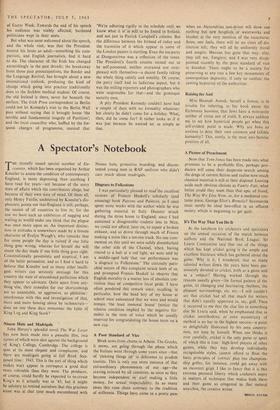Disgrace to Folkestone
I was particularly pleased to read the excellent reviews of Francis Haskell's scholarly (and amusing) book Patrons and Painters, as I once spent some weeks with the author while he was gathering material in Italy. Disaster struck during the drive home to England; since I had sustained a disagreeable roulette loss in Nice, we could not afford, later on, to repair a broken exhaust, and so drove through much of France making a noise like a ten-ton truck. No one com- mented on this until we were safely disembarked the other side of the Channel, when, having roared to a halt at a red light, we were told by a middle-aged lady that our performance was 'a disgrace to Folkestone.' The curiously para- chial nature of this complaint struck both of us, and prompted Francis Haskell to observe that English morality is a matter less of absolute con- viction than of competitive local pride. I have often pondered this remark since, recalling, in particular, how the head boy of my house at school once announced that we were and would remain 'the least immoral house' (notice the relative condition implied by the negative for- mula) in the tone of voice which he usually reserved for congratulating the house team on a new cup.






































 Previous page
Previous page